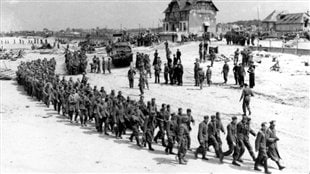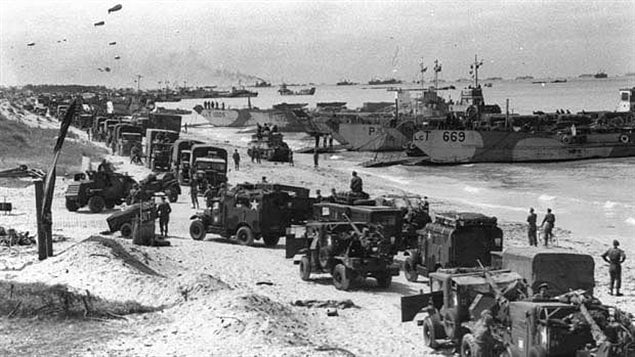In the early hours of June 6, 1944, a massive Allied force of almost 300,000 soldiers with vast amounts of vehicles and supplies was on route from England towards the beaches of Normandy.
Using lessons learned from the massive landings in Sicily a year earlier, and where fighting was continuing in Italy, the Normandy invasion force was about to participate in the greatest invasion in history.
Their task was an almost impossible one.

The majority of the men in the Allied forces had never faced an actually enemy, were heading into territory they did not know, and had to bring all their supplies with them. The Germans were experienced from years of warfare, had prepared massive defences and defence plans, were well-supplied and knew the area very well indeed.
The night before, hundreds of elite paratroops from the 1st Canadian Paratroop brigade had been dropped behind the Germans and begun disruptive attacks as the guns of warships offshore began blasting the shore, while Allied air forces bombed and strafed targets.
In spite of the enormity of the challenge, by the end of the day the Allied forces had forced the German defenders away from the beaches and established a foothold in France.
Canadians had been assigned an eight-kilometer stretch of beach and the towns of Courseulles, Bernieres, and St Aubin, a section code-named Juno. The preliminary bombardments were not as effective as hoped and the Canadians faced heavier opposition than expected from the German 716 Division, who were well warned of the attack as rough weather had delayed the Canadian landing until 0735.
Nevertheless, within two hours, they had pushed the Germans inland, and when operations were called to a halt at 21;00 on that historic day, the Canadians had made the farthest gains inland among the Allied forces.
Within a year, through bloody fighting across Europe and at horrific cost in human lives, the Germans would be forced to accept an unconditional surrender.
This year, on the occasion of this anniversary, a peaceful invasion is taking place as world leaders, veterans, family and citizens gather at sites and ceremonies in Normandy to remember the sacrifice in the name of freedom 70 years ago.
Then Canadian Prime Minister Mackenzie-King’s address to the nation







For reasons beyond our control, and for an undetermined period of time, our comment section is now closed. However, our social networks remain open to your contributions.